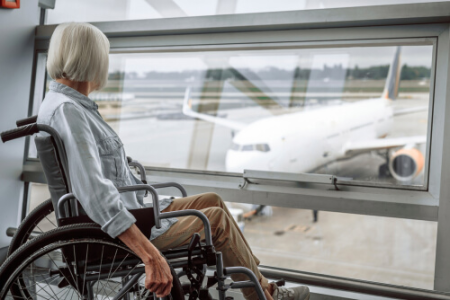Discover how this new campaign aims to transform air travel accessibility!
- Replies 10
For far too long, the travel industry has let down passengers with accessibility needs. From lengthy delays to damaged wheelchairs, many seniors have been repeatedly let down when travelling.More often than not, their experiences go unnoticed. Until now.
TV presenter and disability rights campaigner Sophie Morgan turned her own unfortunate experience into a trigger for change. In February this year, Morgan’s wheelchair was broken on a British Airways flight. Inspired to do her part, she teamed up with Disability Rights UK to launch a new campaign - Rights on Flights.
The goal is simple: to make air travel a more accessible and safe experience – particularly for seniors and those with disabilities.
'The majority of the time when I fly, something bad happens,' says Morgan. 'I’ve normalised the experience of something going wrong.'
After her wheelchair was damaged, she decided to take action.
'It was on the back of other stories over the last six months — I thought, it’s getting out of hand.' However, she is still very optimistic that positive change can be achieved.
'The industry is recognising its systems aren’t working. Solutions need to be expedited.'

Travelling should be an exciting time, but for many with accessibility needs, it can be the opposite. Image Credit: Shutterstock
Rights on Flights is urging the UK parliament to enable the Civil Aviation Authority (CAA) to issue fines to any airlines that fail to provide an acceptable experience for those who require special assistance. In the long term, the goal is to make sure that all passengers, regardless of age or ability, can enjoy a safe, efficient, and comfortable flight.
But has the situation for those with special requirements deteriorated since the pandemic, or is it just better reported now?
Roberto Castiglioni, who has been campaigning for accessible air travel for the past 11 years as director of Reduced Mobility Rights, believes it is the former.
'Service levels have dropped significantly since the pandemic — the aviation industry is still struggling to catch up, with demand growing faster than expected,' he says.
The problem isn’t exclusive to wheelchair users either. According to a 2021 census, a staggering 17.8 million people in the UK have some kind of disability - and many of them require assistance when flying.
What these passengers need, the campaigners argue, is an opportunity to 'customise' their travel rather than being issued with a 'one size fits all' model of help.
But why are wheelchairs even getting broken in the first place?
The answer lies in aircraft design. No passenger airlines have planes with space allocated for wheelchairs, despite recent re-designs and refits. Moreover, Castiglioni warns wheelchairs 'are often mishandled. Handlers see them as cargo, not as someone’s legs.'
Morgan is calling for legislation to ensure that future aircraft are fully accessible and better designed, with space to keep wheelchairs on board and improved toilet facilities.
Installing these features would improve the assisted travelling experience and reduce the risk of injury or inconvenience for older passengers as well.
At the moment, wheelchair users have to ask the crew to take them to and from the toilet in uncomfortable 'aisle chairs' with the cubicle door open.
Things are different overseas, however. In the United States, every airline is responsible for providing special assistance. In the UK and Europe, it is largely left up to the airport.
Key Takeaways
- The Rights on Flights campaign, launched by TV presenter Sophie Morgan and Disability Rights UK, aims to improve the airline experience for passengers with disabilities.
- The campaign seeks short-term solutions, such as enabling the Civil Aviation Authority (CAA) to fine providers who fail passengers with disabilities, and long-term goals, such as providing made-to-measure assistance and advocating for wheelchair spaces on planes.
- The current situation affects not just wheelchair users but also people with mobility issues, blind individuals, and those with sensory issues who may require assistance during their airport journey.
- The campaign calls for legislation to ensure that future aircraft be fully accessible, with space to keep wheelchairs on board and better-designed toilets.
So is the current system fit for purpose?
Morgan is calling for fines if airports 'break equipment, don’t provide the right assistance or leave us on board too long'.
At the same time, great strides can be taken to ensure that all passengers can have an enjoyable and safe experience on their journey.
Members, what have been some of your experiences flying? Do you think Morgan’s Rights on Flights campaign is an appropriate step forward to ensure more equitable travel? What other tips do you have to make your flying experience smoother? Share your thoughts with us in the comments!







